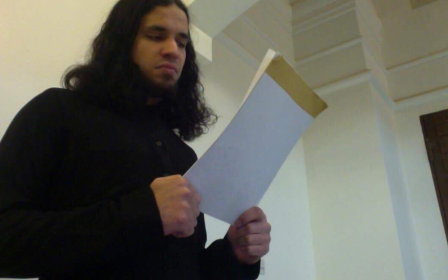Prison for dabbing: Saudi entertainer locked up for 'inciting drug abuse'
Saudi Arabian entertainer Abdullah al-Shahrani was detained by Saudi authorities after "dabbing" during a concert in the western city of Taif.
Al-Shahrani, a famous TV personality and singer, did the dance move on stage at a concert which was held over the weekend.
The "dab" was first made popular in a 2014 music video from Atlanta rapper Skippa da Flippa, and has since become a popular move used by artists, celebrities, athletes and others all over the world.
The move is officially banned by the Saudi Interior Ministry’s National Drug Control Commission, which consider the move to be a reference to cannabis consumption.
In a poster published by the Commission, dabbing is referred to as “the inhalation of the vapours of hashish or marijuana”.
Al-Shahrani apologised for his actions on Tuesday on his Twitter page:
Translation: I give my sincerest apologies to our respected government and my great audience for the spontaneous and unintentional move I made at the Taif festival. Please accept my apologies.
His move sparked mixed responses from social media users.
Some considered the move to be an obvious "negative influence" on people.
Translation: The 'dab' s negative impact is clear! And the excuse is not convincing, In this way any move that offends peeople we can just call 'spontaneous'.
While others criticised the Saudi authorities for limiting "freedom of expression""
Another Saudi singer, Rabeh Saqer also performed the move in a concert in Egypt, attracting criticism of his own.
Following the criticisms Saqer also tweeted an apology for the move showing his "full support" for the country’s war on drugs.
Translation: We stand by the National Commission #Nebras and warn our youth of drug abuse, and we were not aware of the meaning or intention of this move, and we are all together in the fight against drugs.
The secretary general of the National Drug Control Commission, Abd al-Elah al-Sharif said in an interview with al-Arabiya “the move is a well-known move…known to represent smoking hashish which leads to addiction.”
He added that there was “no doubt” that anyone taking part in the move would be subject to questioning and punishment.
The move could warrant a prison sentence, a fine or both.
Al-Sharif told Okaz newspaper that anyone who "incited drug abuse" would be arrested in the same way, and that the move was "contrary to the national strategy to combat drugs"
New MEE newsletter: Jerusalem Dispatch
Sign up to get the latest insights and analysis on Israel-Palestine, alongside Turkey Unpacked and other MEE newsletters
Middle East Eye delivers independent and unrivalled coverage and analysis of the Middle East, North Africa and beyond. To learn more about republishing this content and the associated fees, please fill out this form. More about MEE can be found here.





